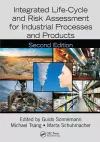
Integrated Life-Cycle and Risk Assessment for Industrial Processes and Products
3 contributors - Paperback
£45.99
Prof Dr. Guido Sonnemann is full professor at the University of Bordeaux, France, where he holds a chair of excellence on Life Cycle Assessment and heads The Life Cycle Group CyVi at the Institute of Molecular Sciences. The group does research on Life Cycle Assessment and Sustainable Chemistry. Dr. Sonnemann’s main research interests are in the fields of life-cycle assessment and sustainable materials management; he is especially interested in the linkages of life-cycle approaches to risk assessment, including organic chemicals, engineered nanomaterials and critical raw materials.
Until 2012 Prof. Dr. Sonnemann was UNEP Programme Officer for Sustainable Innovation and Life Cycle Management. In this function he served as the Science Focal Point for the UNEP’s Resource Efficiency sub-programme. He worked in the Sustainable Consumption and Production (SCP) Branch, Division of Technology Industry and Economics (DTIE) in Paris. He was co-initiator of the International Resource Panel and responsible for the working groups on global metal flows and water efficiency. He set up and oversaw the Secretariat of the UNEP/ SETAC Life Cycle Initiative throughout the 10 years in UNEP. In addition, he was involved in the development of several other innovative projects.
Before joining UNEP in 2002, Prof. Dr. Sonnemann worked as consultant with the Chemical Technology Centre of Tarragona/ Spain. He holds a Ph.D. in Chemical Engineering from the University Rovira & Virgili in Tarragona, Spain (2002), M.Sc. in water biology and chemistry from the Engineering School of Poitiers, France (1996), and graduated as environmental engineer from the Technical University of Berlin, Germany (1995) with a specialization in waste management and pollution prevention. He is authors of a number of books and UN reports as well as more than 100 scientific papers and book chapters. He is co-chair of the Executive Committee of the Forum for Sustainability through Life Cycle Innovation (FSLCI) and member of the Life Cycle Initiative and the Society of Environmental Toxicology and Chemistry (SETAC).
Michael Tsang, Ph.D. is the owner and principal consultant at Three Pillars Consulting, an environmental and sustainability services company based in the Sultanate of Oman. He has been working for many years in the fields of environmental sciences and public health and how they related to industries and economic activity. Specifically, Dr. Tsang has focused on the risks associated with and the benefits offered by emerging technologies to society. Such technologies include renewable energies such as solar photovoltaics and biofuels as well as engineered nanomaterials used in agriculture, textiles and electronics. He has presented at major international conferences on the subject and has published the results of his work in highly ranked international journals such as Nature Nanotechnology.
Prior to starting Three Pillars Consulting, Dr. Tsang was a contract-consultant to the U.S. Army Corps of Engineers Engineer Research and Development Center, in the department of Risk and Decision Sciences. There he worked on risk assessments, life-cycle assessments and multi-criteria decision analysis. Michael was also a research fellow at the U.S. Environmental Protection Agency in Washington, D.C. within the Office of Research and Development’s Chemical Safety for Sustainability program. There, he worked on building novel datasets and environmental models for chemicals.
Dr. Tsang holds a Ph.D. on the topic of Eco-Design of Third Generation Photovoltaic Solar Cells from the University of Bordeaux. He graduated with a bachelor’s degree in Biology from the University of California, San Diego and a master’s degree in Public Health, with a focus on environmental sciences and toxicology, from the University of California, Los Angeles.
Prof. Dr. Marta Schuhmacher is a full professor in the School of Chemical Engineering at the Rovira i Virgili University (Tarragona, Spain). She received her B.Sc. in chemistry from the University of Zaragoza (1976), her B.Sc. in oceanography chemistry from UNED (1991), her Ph.D. in analytical chemistry from University of Zaragoza (1991), and master in environmental engineering and management from the School of Industrial Organization (EOI) (1995).
She has been invited as scientific expert to different research groups such as the Department of Environmental Health Sciences, School of Hygiene and Public Health, The Johns Hopkins University, Baltimore, MD; Nelson Institute of Environmental Medicine, New York University; Departement de Medicine et Hygiene du Travail et de l’Environnement (MDTE), The University Catholique de Louvain; Environmental Organic Chemistry and Ecotoxicology Research Group, Environment Science, University of Lancaster.
Prof. Dr. Schuhmacher co-managed the master environmental engineering and management program and the master occupational health and safety program at Rovira i Virgili University (Tarragona). Her main research interests are environmental impact pathway analysis, risk assessment, environmental toxicology and health, occupational exposure, multimedia model, life-cycle assessment, substance flow analysis, environmental indicators and Monte Carlo analysis. Prof. Dr. Schuhmacher has published more than 300 scientific papers and book chapters. She has served in international symposia as co-chairman and invited lecturer. She is a member of the NEHA (National Environmental Health Association) and the SETAC (Society of Environmental Toxicology and Chemistry).